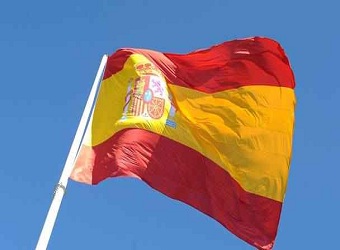A general strike in Catalonia on Tuesday will likely bring much of the wealthy Spanish region to a standstill, a move bound to ratchet up tensions with Spain’s government following a fractious independence vote at the weekend.
A large number of pro-separatist trade unions, businesses, schools, transport networks and cultural institutions – even the region’s successful soccer team FC Barcelona – are expected to stay closed or run heavily-reduced services on Tuesday in a protest against the Spanish police’s violent crackdown on the vote held Sunday.
Large trade unions have organized the strike, calling on all members of Catalan society to take part following what they called a violation of citizens’ rights and freedoms following the Spanish government’s attempts to thwart the vote.
Spanish riot police reportedly used rubber bullets and batons against members of the public trying to vote on Sunday, as well as storming polling stations to seize ballot boxes. A total of 893 people were injured as a result of the crackdown, according to the Catalan Department for Health.
Spain’s constitutional court has said any independence vote in Catalonia is illegal and Prime Minister Mariano Rajoy has said he did not recognize the vote on Sunday, which saw 90 percent of the 2.26 million people who went to the polls, vote for independence. Voter turnout was low, however, around 42 percent and many people who oppose independence abstained from voting.
Catalan pro-independence figure and leader of the regional government Carles Puigdemont, said on Monday that he saw the vote as binding and plans to take the referendum results to the Catalonian parliament in the next few days.
Rajoy ‘should go’
Mayor of Barcelona Ada Colau told CNBC on Monday that even though she wasn’t pro-independence, the Catalan people deserved to have a vote on the matter.
“What we need is a democratic response. And we need a political solution. And we need an inclusive solution that listens to the cries of millions of people,” Colau told CNBC on Monday, adding to calls for Rajoy to step down.
“I think that in order to form a political solution, the first thing would be the resignation of Mariano Rajoy. And the international community, and specifically the European Union, must help us to create conditions for a political solution, for mediation,” Colau said, adding that currently the atmosphere between Catalonia and Spain was “one of tension, of blockage.”
Catalan leader Carles Puigdemont said on Monday that he had not any contact from the Spanish government regarding negotiations and he called on the European Union to mediate. He has not ruled out making a unilateral declaration of independence, however, keeping that option on the table while Spain decides a course of action regarding Catalonia.
Any declaration of independence would likely plunge Spain into a further constitutional crisis and could prompt Rajoy to try to seize powers back from the Catalan government, a move likely to inflame the situation further.
For its part, the European Commission — the executive arm of the EU — criticized the violence but said on Monday that any independent Catalonia would find itself outside the 28-member trading bloc.
Momentum
A number of large workers’ unions are set to take part in the strike on Tuesday and the standstill will have an economic impact – Catalonia accounts for around 20 percent of Spain’s entire gross domestic product (GDP) and a quarter of its exports – making it no small deal for Spain if the strike is observed by a large number of Catalonia’s 7.5 million population.
Miriam Tey, vice president of Societat Civil Catalana, a political group that’s opposed to independence, told CNBC that dialogue was now crucial.
“The saddest thing, apart from the injuries of people, was that dialogue was broken and society broken up as well,” she told CNBC on Monday, saying that the most positive outcome was to return to dialogue.
With Catalonia able to take the moral high ground for now given the fierce crackdown from the government on Sunday, pro-independence sentiment has not been dented and has possibly increased.
Eurasia Group President Ian Bremmer said in a note on Monday that “momentum is now solidly with the Catalan movement … There’s room for negotiation going forward. The Mayor of Barcelona has herself been opposed to independence but is strongly pro-referendum; Following the weekend’s clashes the Catalan government is likely to declare ‘independence,’ but the reality is that she’s now more empowered to negotiate for more regional autonomy,” he said.
“The Basque region in Spain presently has more rights of autonomy than Catalonia, so there’s precedent for an outcome that can satisfy both sides,” he noted.
Source: CNBC


